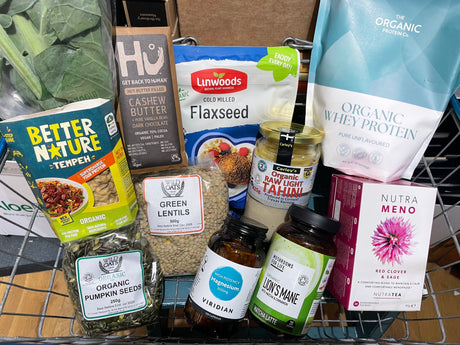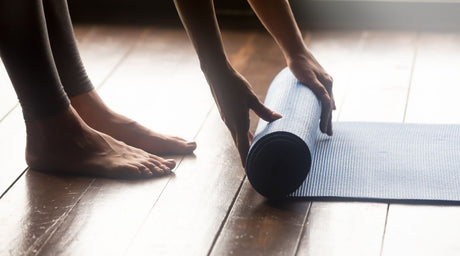Good quality sleep is the foundation of health and wellbeing. Sleep issues are a common concern, and it’s one of the areas we frequently help our customers with at Wild Oats. It allows your body and mind to recharge, supporting the vital processes that help you feel refreshed and ready to take on the day.
It’s one of those things we simply can’t do without, but so rarely make enough time for. When we do, it can be unfathomably difficult to get a good night’s sleep. But mental as well as physical wellness and sleep go hand-in-hand.
It’s during sleep that our body’s tissues are repaired, and its reserves restored and so for the sake of our health, it may be a good time to look at just how well we sleep.
Quality sleep not only boosts your daily energy but also supports long-term health and helps prevent chronic diseases. At Wild Oats, we're passionate about providing expert nutritional advice to support your wellness journey.
Stop by and chat with one of our nutrition experts in-store for free, personalised advice and find the perfect solutions for a peaceful night’s sleep.
Stay calm. Sleep better. 🌙✨
Why can’t I sleep?
We live in an information age, and sleep can offer us a welcome reprieve from the constant bombardment of the senses by things like our bright phones and tablets. Indeed, it may well be one of the only retreats we have from the outside world, and therefore ensuring that the rest we get is as good quality as possible should become imperative. But the bombardment of the senses takes its toll on the ability of our minds to ‘switch off’ so we can’t sleep.
There are three types of insomnia:
- The first is the type that simply won’t let you drift off in the first place.
- The second takes the form of waking you up repeatedly during the night.
- The third is the type that wakes you up early in the morning and prevents you from falling back to sleep.
How to get to sleep
There are three principal factors to take into consideration if you want to improve the quality of your sleep.
Environment
Ensuring that you sleep in a dark room can greatly improve the quality of your sleep. Tryptophan is the rarest of the amino acids. Under good dietary conditions, tryptophan is metabolised into serotonin, the ‘happy’ chemical which reduces anxiety and enhances mood.
In the dark, serotonin is metabolised into melatonin, the brain’s sleep hormone. So, try blocking out as much light as possible from your windows, and consider investing in a good eye mask.
You might also want to check the temperature of your bedroom. Ideally, your room will be 21 degrees. Similarly, check the noise level in your bedroom at night. Earplugs might be useful too.
Behaviour
Routine can be important in establishing a healthy sleep pattern when you can’t sleep. But admittedly it can be difficult to achieve. You should aim to wind down about an hour before you go to bed.
Do something you find relaxing, play sleep music, switch off the tv and computer, lower the lights. Try to associate your bed only with sleep. Avoid watching tv or reading (particularly more engaging books) in bed.
Although a good level of exercise is good for you and can aid healthy sleep, try to avoid exercising just before going to bed. Whether you’re exercising at home or going out, choose to exercise in the morning or late afternoon.
Diet to improve sleep
Tryptophan
We’ve already identified tryptophan as important in aiding sleep. Tryptophan is a component of protein, but simply by eating protein-rich foods may not help. In fact, it can make things worse. Tryptophan can only access the right part of the brain to induce sleep if combined with a carbohydrate. Tryptophan-rich foods include pumpkin and squash seeds.
Protein
So, while moving towards a higher-protein diet will help overall, we need to ensure we consume a certain amount of carbohydrates too and try to avoid the tendency to overload our plates with protein at dinner time. We have lost our healthy intuition when it comes to food, and because of the way the modern world works, we often don’t eat the right combination of foods at the right time.
Try to include a rich source of protein in combination with a carbohydrate at breakfast time (breakfast cereals for example tend to be carb-heavy, and more often than not, they consist of high GI carbs). It’s also far better to have a bigger meal at lunchtime in order to avoid the need to over-consume protein closer to bedtime. If you ensure you consume good sources of protein at breakfast and lunchtime, this will help.
Caffeine
When it comes to diet, you might also want to check your caffeine intake. Caffeine has a stimulating effect, and it accumulates in your body, so try to avoid drinking caffeinated drinks after lunch. There are plenty of herb teas out there to be enjoyed as alternatives.
Alcohol
Alcohol can also impede healthy sleep patterns. Although we might fall to sleep more quickly after a glass or
two, alcohol suppresses our ability to experience deep sleep so we’re unlikely to wake up feeling well-rested.
Calcium & Magnesium
Calcium and magnesium can help by calming the body and mind. Magnesium is a particularly important mineral in which the majority of us are likely to be deficient. Intensive farming and the resulting depletion of our soils means that we can no longer get a good enough level of magnesium from our food.
The milling of grains and the refining process of food further reduces the level of magnesium available to us. Leafy greens are always a good choice of veg and should be part of your daily diet. Green foods are rich in calcium and magnesium, magnesium is at the centre of every chlorophyll molecule.
Other calming foods include chia seeds, mulberries and lemon, and silicon-rich foods (which aid calcium metabolism) like barley and oats, rice and mushrooms. Herbs and spices that may help include basil and dill, chamomile and Valerian.
When it comes to meal times, again strive for regularity, and avoid eating at least an hour before bed. Try to eat as early as possible. Your body must work to digest food, so reducing its need to work when it should be resting can only be a good thing. When it isn’t trying to digest food, your body will use its energy to repair, restore and heal instead.
How yoga can help you sleep
Yoga can help calm your body and mind. When you focus on your breathing, you stimulate the vagus nerve. This nerve affects your parasympathetic nervous system (PNS) which helps you rest and get a better night's sleep.
Practising yoga also focuses on mindfulness. Mindfulness can help control your heart rate and boost your levels of melatonin, a hormone that helps you sleep.
Top 6 places to do yoga in Bristol.
Yoga poses that aid sleep
Supta baddha konasana
Also known as the reclining butterfly pose. Lie on your back and bend your knees. Bring the soles of your feet together and let your knees gently fall to the sides. You can bring your hands above your head or leave them by your sides, whichever is most comfortable.
Savasana
This is normally the last pose in a yoga session. Lie on your back with your palms up and legs straight. Close your eyes and focus on your breathing.
How much sleep do I need?
People have different needs when it comes to the quantity of sleep required. On average we sleep 2 hours less than our relatives only 50 years ago. While they used to sleep 9 hours a night on average, now we only sleep 7. And many of us won’t always manage that!
If you can’t sleep, try waiting until you’re tired before going to bed (but avoid going beyond tiredness too). You can also try adopting the 15-minute rule: if you don’t fall asleep within 15 minutes of getting into bed, get up and do something else for a while, in another room even, before you try again. It’s important to try and avoid getting anxious because you can’t sleep as this will only exacerbate the problem.



